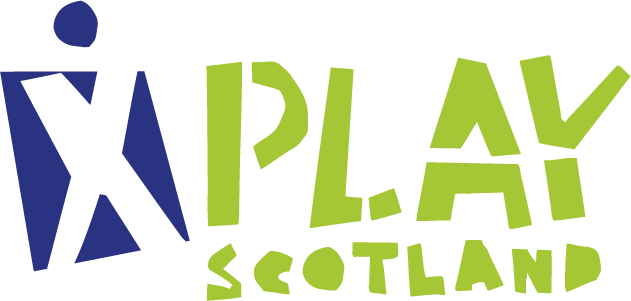Recently, our Play Pedagogy Co-ordinator Fiona Kirkland had the opportunity to attend the Froebel in Childhood Practice Summer Course, held at the University of Edinburgh.
At school, my teachers told my parents that I had an inquisitive mind, they also told them that I talked too much and was prone to daydream, but let’s not go into that here!
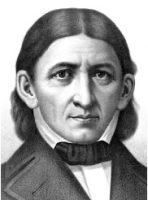 Over the last couple of decades, I’ve put my inquisitive mind to studying various theories surrounding child development and play, so when I got the opportunity to sign up for the Froebel in Childhood Practice Summer Course, held at the University of Edinburgh, I jumped at the chance. I knew that this was going to be a great opportunity to expand my mind and learn much more about the ‘man of the moment’ in Early Education, Friedrich Froebel. To hear it explained by experts in the field such as Dr Jane Read, Helen Tovey, Dr Lynn McNair, Jane Whinnett and Catriona Gill was the cherry on top of the Froebel Cake.
Over the last couple of decades, I’ve put my inquisitive mind to studying various theories surrounding child development and play, so when I got the opportunity to sign up for the Froebel in Childhood Practice Summer Course, held at the University of Edinburgh, I jumped at the chance. I knew that this was going to be a great opportunity to expand my mind and learn much more about the ‘man of the moment’ in Early Education, Friedrich Froebel. To hear it explained by experts in the field such as Dr Jane Read, Helen Tovey, Dr Lynn McNair, Jane Whinnett and Catriona Gill was the cherry on top of the Froebel Cake.
It was also an opportunity to meet some like-minded colleagues, and I wasn’t disappointed. Most of the other learners on the course have roles within Scottish education, however some came from as far afield as Taiwan and Malta. To think that what we are doing in Scotland is contributing to ideas and early years practice across the world is very encouraging.
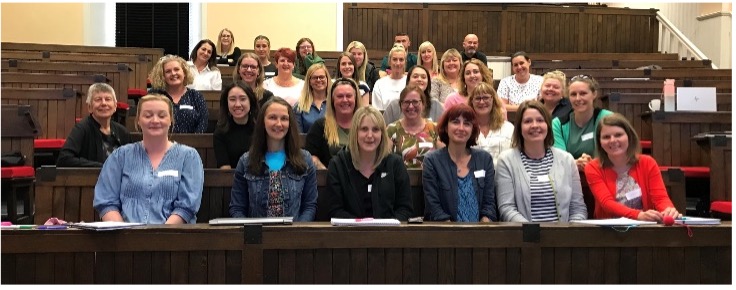
Day One
On our first day we were treated to a presentation by Dr Jane Read, from the University of Roehampton, on Froebel’s life, pedagogy, and the impact that his theories have had on developing ideas about learning spaces and resources. It was encouraging to hear one of my favourite Froebel quotes about play…
‘Play is the highest level of child development. It is the spontaneous expression of thought and feeling – an expression which his inner life requires. This is the meaning of the word ‘play’…It promotes enjoyment, satisfaction, serenity and constitutes the source of all that can benefit the child…At this stage play is never trivial; it is serious and deeply significant.’
– (Froebel (1826) in Lilley (1967) p83-4)
I found it very uplifting to think that Froebel wrote this back in 1842 about the purpose of his Kindergarten at Bad Blankenburg, and I think what he said is not too dissimilar to our own contemporary ideas about play pedagogy, which is at the heart of our recent Play Pedagogy Award that aims to promote more play in schools.
Day Two 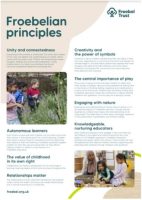
Day two began with a discussion by Catriona Gill and Jane Whinnett on how
Froebel’s Principles impact on current research and policy. It was very interesting to see his ideas included in the Health and Social Care Standards (2017) and the seven principles for curriculum design which you might recognise from the Curriculum for Excellence (2004).
My favourite part of day two was when we looked at the importance of play, it 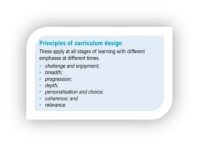 was very inspirational to read about play in Scottish Policy and to see the many documents that promote play in Scottish early years settings and schools.
was very inspirational to read about play in Scottish Policy and to see the many documents that promote play in Scottish early years settings and schools.
Day Three
On day three we were extremely lucky to listen to a presentation by Helen Tovey on outdoor play. This was thrilling for me as her seminal book on playing outdoors has been a huge inspiration for me over the years. Some of the interesting topics that she discussed were children’s declining access to outdoor spaces, why we should reflect on our own attitude to outdoor play and the environment that we offer children. We had long discussions on risk, safety, adventure and challenge and our role as the adult. I think this quote from Froebel shows the importance of promoting positive risk taking.
‘….a child who lacks experience will not know [their]capabilities and is more likely to encounter danger.’
– (Froebel in Lilley 1967)
Helen spoke about the importance of nature and the fact that it offers a rich sensory environment to encourage creativity, complexity and health and wellbeing. I found this very interesting as it links in very well with the Play Scotland’s ‘Play Sufficiency Assessments’ (found at https://www.playscotland.org/projects/play-sufficiency-assessments/) which I have recently been involved in, and our Playful Street Toolkit (found at https://www.playscotland.org/resources/print/Playful-Streets-Toolkit.pdf?plsctml_id=22323).
We also had the opportunity to discuss loose parts play and I was able to share copies of Play Scotland’s loose parts play toolkit (found at https://www.playscotland.org/resources/loose-parts-play-toolkit-2019-web-2/) with the others on the course.
We had a lovely afternoon wandering around the centre of Edinburgh with our 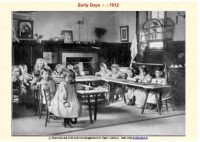 very knowledgeable guide, Jane Whinnett, who took us on a walking tour which included the site of St Saviours child-garden which was opened in 1906 and was one of the first free kindergartens. It was a lovely sunny afternoon in Edinburgh and a delight to walk around and hear Jane tell us about the importance of the places that we visited.
very knowledgeable guide, Jane Whinnett, who took us on a walking tour which included the site of St Saviours child-garden which was opened in 1906 and was one of the first free kindergartens. It was a lovely sunny afternoon in Edinburgh and a delight to walk around and hear Jane tell us about the importance of the places that we visited.
Day Four
Day Four we learned more about Froebel’s gifts and occupations from Jane Whinnett. It was very interesting to learn about the six different gifts that Froebel 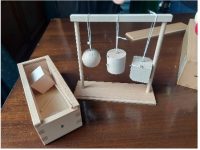 designed to encourage children to experiment and build upon their knowledge and skills and make connections in their learning, moving from simple to complex and how they provide children with an opportunity to explore aspects of mathematics, science, engineering, and architecture.
designed to encourage children to experiment and build upon their knowledge and skills and make connections in their learning, moving from simple to complex and how they provide children with an opportunity to explore aspects of mathematics, science, engineering, and architecture.
Jane also told us about Froebel’s Occupations, explaining how educational 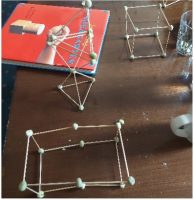 activities such as paper cutting, paper folding, sewing, woodwork, cooking, stick and pea constructions, clay and weaving enable children to be creative, communicate, develop physical and problem-solving skills, and develop their understanding of the natural world. Jane had kindly set out some activities where we were able to try these out ourselves. Let’s just say that my pea and stick construction left a lot to be desired, and a career in architecture is not beckoning me anytime soon!
activities such as paper cutting, paper folding, sewing, woodwork, cooking, stick and pea constructions, clay and weaving enable children to be creative, communicate, develop physical and problem-solving skills, and develop their understanding of the natural world. Jane had kindly set out some activities where we were able to try these out ourselves. Let’s just say that my pea and stick construction left a lot to be desired, and a career in architecture is not beckoning me anytime soon!
Catriona Gill inspired us all with her enthusiasm and love of Block Play. I have been very lucky to have spent time over the years observing children building fabulous small, large, and sometimes verylarge constructions.
‘When children first encounter blocks, they need space and time to explore with all of their senses. For young children grasping the block and passing it from hand to hand, hand to mouth or dropping it may be the first exploration. Knocking down, pulling or tipping out blocks sees the child beginning to act on the world around them through his own doing, feeling, and thinking.’
– (Froebel in Lilley 1967 pg119).
Catriona explained some of the benefits that using wooden blocks has for 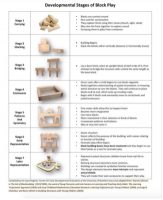 children’s cognitive, physical, and social development, as it helps them to develop abstract, logical, and symbolic thinking, mathematical concepts, language, creative learning, and development. We also looked at the important role of the adult in supporting and extending and how we can use our pedagogical knowledge to spot schemas and Catriona explained about the seven stages of block play.
children’s cognitive, physical, and social development, as it helps them to develop abstract, logical, and symbolic thinking, mathematical concepts, language, creative learning, and development. We also looked at the important role of the adult in supporting and extending and how we can use our pedagogical knowledge to spot schemas and Catriona explained about the seven stages of block play.
‘For children who can walk, transporting blocks from place to place, placing them in containers and knocking them down is the beginning of schematic behaviours and developing concepts of quantity, volume and gravity’.
– Whinnett, (2020:8)
After lunch, Jane Whitten fascinated us with her vast knowledge of treasure baskets, which really encouraged us to think about heuristic play and loose parts. Jane gave us background on Elinor Goldschmied, the innovator of treasure baskets, heuristic play, and the key person approach, and who has had a huge impact on early years practice in Scotland and across the world.
At the end of the day, we looked at the symbolic life of the child. One of my favourites quotes from day four was…
‘…a child involved in symbolic play learns that language, ideas and objects can be flexible, and an object is not defined by its name’.
– (Holland 2003:33)
Over the years, I’ve observed many children use representation especially when engaged in role play….’the stick is a wand’….’the wooden block is a phone’…and I’ve taken part in many, many pretend tea parties, where I was disappointed to find out that it was a wooden block and not an actual piece of chocolate cake that I was being presented with!
Day Five
Our last day started with a presentation about Policy in Scotland through a Froebelian lens. We were encouraged to reflect upon the origins of the jobs that we do and where our organisation began. I’m very lucky to work for Play Scotland who are a long-established organisation(established in 1998) at the forefront of promoting and advocating for play-based learning approaches in early education, and are the lead organisation for the development and promotion of children and young people’s play in Scotland.
We looked at the changes in policy over the years, from back in Froebel’s time where he opened up opportunities for women to work in his kindergartens, the recognition that childhood is a stage in its own right and the importance of child-centred practice, right through to his influence on contemporary policy and legislation such as Realising the Ambition (2020).
Finally, we had a much-anticipated presentation by Dr Lynn McNair about the Cowgate Under 5’s Centre. I have heard so much about Cowgate over the years and I was absolutely fascinated to hear about their practice and ethos, and I wasn’t disappointed! It was inspiring to hear about their ‘lived stories’ way of recording observations and I’m sure that many fellow course attendees will be trialling this in their settings. It was fascinating to hear about the children baking their bread for snack and engaging with nature in all weathers.
As you can see, I’ve had a busy but very enjoyable week. I’ve learned a lot about Froebel, about myself and I met some very lovely people. As a final word, I’d like to share with you my favourite quote of the week….
‘Let us live for our children; then will their lives bring us joy and peace and we shall ourselves begin to grow in wisdom.’
– (Froebel 1885)
